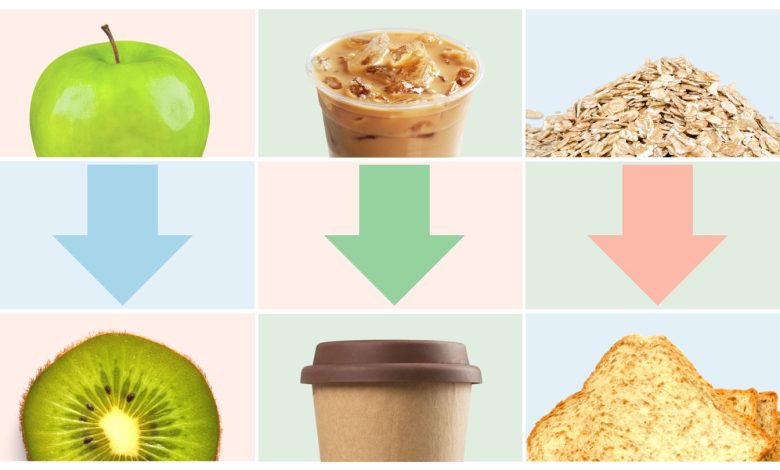6 Smart Food Swaps for Your IBS-C Diet

[ad_1]
When managing irritable bowel syndrome with constipation (IBS-C), it can be hard to know how to start building a diet that won’t trigger symptoms. Making a few easy, important swaps may make all the difference when it comes to keeping bloating, stomach pain, and constipation at bay.
“What you eat and how you eat is so important when you have IBS-C,” says Katrina Cox, a registered dietitian specializing in IBS and gut health in Providence, Rhode Island.
IBS-Friendly Food Swaps to Ease Constipation
The good news is, you can keep your diet rich and varied with some smart food swaps. Bonus: Because these foods support healthy digestion, they’ll help you stay more regular. Here are six to try:
1. Reach for Cooked Veggies Over Raw
It’s so easy (and refreshing!) to grab a handful of baby carrots or broccoli florets out of the fridge to dip into hummus — plus, they provide fiber, which helps keep things moving. But, according to Cox, the body typically tolerates cooked vegetables better than raw veggies. This is because cooked vegetables require less effort to digest, so your body doesn’t have to work as hard at breaking them down. Even just steaming your vegetables makes digesting them easier for your body.
The best veggie choices for IBS-C are those that are low in FODMAPs (fermentable oligosaccharides, disaccharides, monosaccharides, and polyols), which are a group of carbohydrates that aren’t able to be completely digested or absorbed by the body. Because IBS causes a sensitive gut, incorporating low-FODMAP foods is all the more important. High-FODMAP foods are rich in certain carbohydrates that tend to trigger IBS symptoms. And, because they aren’t digested properly, high-FODMAP foods can feed bacteria into your gut that increase gas and other abdominal symptoms. Low-FODMAP vegetables include carrots, cucumbers, green beans, green bell peppers, potatoes, and zucchini.
2. Swap Wheat Toast for Oatmeal
If you’re typically doing toast for breakfast, switch to oatmeal. Wheat bread contains sugars that are associated with IBS symptoms. Oatmeal, on the other hand, is a good source of soluble fiber that soaks up water to bulk up your stool, making it easier to pass, according to Johns Hopkins Medicine.
3. Take Your Coffee Hot Instead of Iced
A steaming cup of joe can help you stay regular. Coffee contains chlorogenic acid, which stimulates digestion, and caffeine, which stimulates movement in the colon. One tip: Consider taking your coffee with almond milk rather than cow’s milk, which is a high-FODMAP beverage.
4. Skip Onions and Garlic and Try Scallion Tops and Chives
While garlic and onions are two of the foods that make so many meals taste great, they are both high in FODMAPs and common culprits behind IBS symptoms. If you’re still chasing that oniony taste, Cox recommends using scallion tops (the green part of green onions) or chives.
Another clever tip? Use garlic- or onion-infused oil to cook. All you get is the flavor in the oil, not the FODMAP, she says. You can buy these oils at specialty markets or create your own by sautéing garlic or onion in oil and then removing (and discarding) the solids from the oil.
5. Switch Out (Some) Meat for Plant-Based Proteins
There’s no reason to exclude animal protein from your diet if you have IBS-C, but you may want to replace at least some of it with plant proteins, such as tofu and tempeh. Because they’re fermented, these soy products are a rich source of probiotics that can help populate your gut with digestion-friendly bacteria, which can ultimately give your immune system a boost as well. If you aren’t a fan of plant-based proteins, opt for other fermented foods, such as kefir, kimchi, kombucha, or sauerkraut.
6. Opt for Chia Seeds and Flaxseed Over Pistachios
Pistachios and cashews are high in FODMAPs. Instead, Cox recommends trying the fiber-packed seeds of chia and flax plants. A half ounce of chia seeds offers about 5 grams of fiber, while a tablespoon of ground flaxseed has about 2 grams of fiber. She suggests adding them to a yogurt parfait or overnight oats.
When looking to ease constipation, adding more fiber into your diet, along with adequate water, is the way to go. But, keep in mind that fiber adds to IBS-C symptoms for some people. So, as mentioned earlier, it’s important to learn which foods satisfy your taste buds, fill you up, and don’t trigger your IBS symptoms.
[ad_2]




